INTERNATIONAL
STANDARD
ISO
11452-9
First edition
2012-05-15
Road vehicles — Component test
methods for electrical disturbances
from narrowband radiated
electromagnetic energy —
Part 9:
Portable transmitters
Véhicules routiers — Méthodes d’essai d’un équipement soumis à des
perturbations électriques par rayonnement d’énergie électromagnétique
en bande étroite —
Partie 9: Émetteurs portables
Reference number
ISO 11452-9:2012(E)
© ISO 2012
Copyright International Organization for Standardization Provided by IHS under license with ISO Not for ResaleNo reproduction or networking permitted without license from IHS--`,,```,,,,````-`-`,,`,,`,`,,`---�
ISO 11452-9:2012(E)
COPYRIGHT PROTECTED DOCUMENT
ISO 2012
©
All rights reserved. Unless otherwise specified, no part of this publication may be reproduced or utilized in any form or by any means,
electronic or mechanical, including photocopying and microfilm, without permission in writing from either ISO at the address below or ISO’s
member body in the country of the requester.
ISO copyright office
Case postale 56 • CH-1211 Geneva 20
Tel. + 41 22 749 01 11
Fax + 41 22 749 09 47
E-mail copyright@iso.org
Web www.iso.org
Published in Switzerland
ii
© ISO 2012 – All rights reserved
Copyright International Organization for Standardization Provided by IHS under license with ISO Not for ResaleNo reproduction or networking permitted without license from IHS--`,,```,,,,````-`-`,,`,,`,`,,`---�
Contents
ISO 11452-9:2012(E)
Page
Foreword ............................................................................................................................................................................iv
Introduction ........................................................................................................................................................................ v
Scope ...................................................................................................................................................................... 1
1
Normative references ......................................................................................................................................... 1
2
Terms and definitions ......................................................................................................................................... 1
3
Test conditions ..................................................................................................................................................... 1
4
Test location .......................................................................................................................................................... 2
5
Test instrumentation ........................................................................................................................................... 2
6
General ................................................................................................................................................................... 2
6.1
Commercial portable transmitters .................................................................................................................. 2
6.2
6.3
Simulated portable transmitters ...................................................................................................................... 2
Stimulation and monitoring of the DUT ......................................................................................................... 3
6.4
Test set-up ............................................................................................................................................................. 3
7
Ground plane ........................................................................................................................................................ 3
7.1
7.2
Power supply and artificial networks ............................................................................................................. 3
Location of the DUT ............................................................................................................................................ 4
7.3
Location of the test harness ............................................................................................................................. 4
7.4
7.5
Location of the load simulator ......................................................................................................................... 4
Tests ........................................................................................................................................................................ 6
8
General ................................................................................................................................................................... 6
8.1
Test plan ................................................................................................................................................................. 6
8.2
8.3
Test methods ........................................................................................................................................................ 7
8.4
Test report ...........................................................................................................................................................10
Annex A (informative) Typical characteristics of portable transmitters ............................................................ 11
Annex B (informative) Examples of simulated portable transmitter antennas ................................................13
Annex C (informative) Example of test severity levels associated with function performance
status classification ..........................................................................................................................................45
Annex D (informative) Remote/local grounding .......................................................................................................46
© ISO 2012 – All rights reserved
iii
Copyright International Organization for Standardization Provided by IHS under license with ISO Not for ResaleNo reproduction or networking permitted without license from IHS--`,,```,,,,````-`-`,,`,,`,`,,`---�
ISO 11452-9:2012(E)
Foreword
ISO (the International Organization for Standardization) is a worldwide federation of national standards bodies
(ISO member bodies). The work of preparing International Standards is normally carried out through ISO
technical committees. Each member body interested in a subject for which a technical committee has been
established has the right to be represented on that committee. International organizations, governmental and
non-governmental, in liaison with ISO, also take part in the work. ISO collaborates closely with the International
Electrotechnical Commission (IEC) on all matters of electrotechnical standardization.
International Standards are drafted in accordance with the rules given in the ISO/IEC Directives, Part 2.
The main task of technical committees is to prepare International Standards. Draft International Standards
adopted by the technical committees are circulated to the member bodies for voting. Publication as an
International Standard requires approval by at least 75 % of the member bodies casting a vote.
Attention is drawn to the possibility that some of the elements of this document may be the subject of patent
rights. ISO shall not be held responsible for identifying any or all such patent rights.
ISO 11452-9 was prepared by Technical Committee ISO/TC 22, Road vehicles, Subcommittee SC 3, Electrical
and electronic equipment.
ISO 11452 consists of the following parts, under the general title Road vehicles — Component test methods for
electrical disturbances from narrowband radiated electromagnetic energy:
— Part 1: General principles and terminology
— Part 2: Absorber-lined shielded enclosure
— Part 3: Transverse electromagnetic mode (TEM) cell
— Part 4: Harness excitation methods
— Part 5: Stripline
— Part 7: Direct radio frequency (RF) power injection
— Part 8: Immunity to magnetic fields
— Part 9: Portable transmitters
— Part 10: Immunity to conducted disturbances in the extended audio frequency range
— Part 11: Reverberation chamber
iv
© ISO 2012 – All rights reserved
Copyright International Organization for Standardization Provided by IHS under license with ISO Not for ResaleNo reproduction or networking permitted without license from IHS--`,,```,,,,````-`-`,,`,,`,`,,`---�
ISO 11452-9:2012(E)
Introduction
Immunity measurements of complete road vehicles can generally only be carried out by the vehicle manufacturer,
owing to, for example, high costs of absorber-lined shielded enclosures, the desire to preserve the secrecy of
prototypes or a large number of different vehicle models.
For research, development and quality control, a laboratory measuring method can be used by both vehicle
manufacturers and equipment suppliers to test electronic components.
© ISO 2012 – All rights reserved
v
Copyright International Organization for Standardization Provided by IHS under license with ISO Not for ResaleNo reproduction or networking permitted without license from IHS--`,,```,,,,````-`-`,,`,,`,`,,`---�
Copyright International Organization for Standardization Provided by IHS under license with ISO Not for ResaleNo reproduction or networking permitted without license from IHS--`,,```,,,,````-`-`,,`,,`,`,,`---�
INTERNATIONAL STANDARD
ISO 11452-9:2012(E)
Road vehicles — Component test methods for electrical
disturbances from narrowband radiated electromagnetic energy —
Part 9:
Portable transmitters
1 Scope
This part of ISO 11452 specifies test methods and procedures for testing electromagnetic immunity to portable
transmitters of electronic components for passenger cars and commercial vehicles, regardless of the propulsion
system (e.g. spark-ignition engine, diesel engine, electric motor). The device under test (DUT), together with the
wiring harness (prototype or standard test harness), is subjected to an electromagnetic disturbance generated
by portable transmitters inside an absorber-lined shielded enclosure, with peripheral devices either inside or
outside the enclosure. The electromagnetic disturbances considered are limited to continuous narrowband
electromagnetic fields.
2 Normative references
The following referenced documents are indispensable for the application of this document. For dated
references, only the edition cited applies. For undated references, the latest edition of the referenced document
(including any amendments) applies.
ISO 11452-1, Road vehicles — Component test methods for electrical disturbances from narrowband radiated
electromagnetic energy — Part 1: General principles and terminology
Guidelines for Limiting Exposure to Time-Varying Electric, Magnetic, and Electromagnetic Fields (up to 300
GHz). International Commission on Non-Ionizing Radiation Protection (ICNIRP)
3 Terms and definitions
For the purposes of this document, the terms and definitions given in ISO 11452-1 apply.
4 Test conditions
The applicable frequency range of the test method is 26 MHz to 5,85 GHz.
The user of this International Standard shall specify the test severity level or levels over the frequency bands.
The test severity level shall take into account
—
typical portable transmitter characteristics (frequency bands, power level and modulation), given in
Annex A, and
—
the characteristics of the antenna(s) used for this test.
NOTE
as an exhaustive description of various portable transmitters available in all countries.
Users of this International Standard are advised that Annex A is for information only and cannot be considered
Standard test conditions are given in ISO 11452-1 for the following:
—
test temperature;
— supply voltage;
© ISO 2012 – All rights reserved
1
Copyright International Organization for Standardization Provided by IHS under license with ISO Not for ResaleNo reproduction or networking permitted without license from IHS--`,,```,,,,````-`-`,,`,,`,`,,`---�
ISO 11452-9:2012(E)
— dwell time;
—
test signal quality.
5 Test location
The purpose of such an enclosure is to create an isolated electromagnetic compatibility test facility which
simulates open field testing. Basically, an absorber-lined shielded enclosure consists of a shielded room with
absorbing material on its internal reflective surfaces, optionally excluding the floor. The design objective is to
attenuate the reflected energy in the test area by at least 10 dB compared with the direct energy.
6 Test instrumentation
6.1 General
The field-generating device can be
— commercial portable transmitters with integral antennas, or
— simulated portable transmitters, with an antenna used as described in 6.3.4 and an amplifier.
To reduce test error, the operation of the DUT is usually monitored by fibre-optic couplers.
Test personnel shall be protected in accordance with ICNIRP Guidelines.
NOTE
National or other regulations can apply.
6.2 Commercial portable transmitters
Commercial portable transmitters having an integral antenna are a convenient and readily available
field-generating device.
6.3 Simulated portable transmitters
6.3.1 General
Simulated portable transmitters consist of
—
radio frequency (RF) signal generating equipment, and
— RF power monitoring equipment and antennas.
6.3.2 RF signal generating equipment
Signal sources with internal or external modulation capability.
Power amplifier(s): multiple RF amplifiers may be required to cover the range of test frequencies.
6.3.3 RF power monitoring equipment
An in-line power meter is required when using simulated portable transmitters for measuring power to the
antenna. Both forward and reverse power shall be measured and recorded.
6.3.4 Antennas
Unless otherwise specified, the simulated portable transmitter antenna characteristics shall be a passive
antenna as detailed in B.2. Examples of other antennas which may be used are presented in Annex B.
2
© ISO 2012 – All rights reserved
Copyright International Organization for Standardization Provided by IHS under license with ISO Not for ResaleNo reproduction or networking permitted without license from IHS--`,,```,,,,````-`-`,,`,,`,`,,`---�


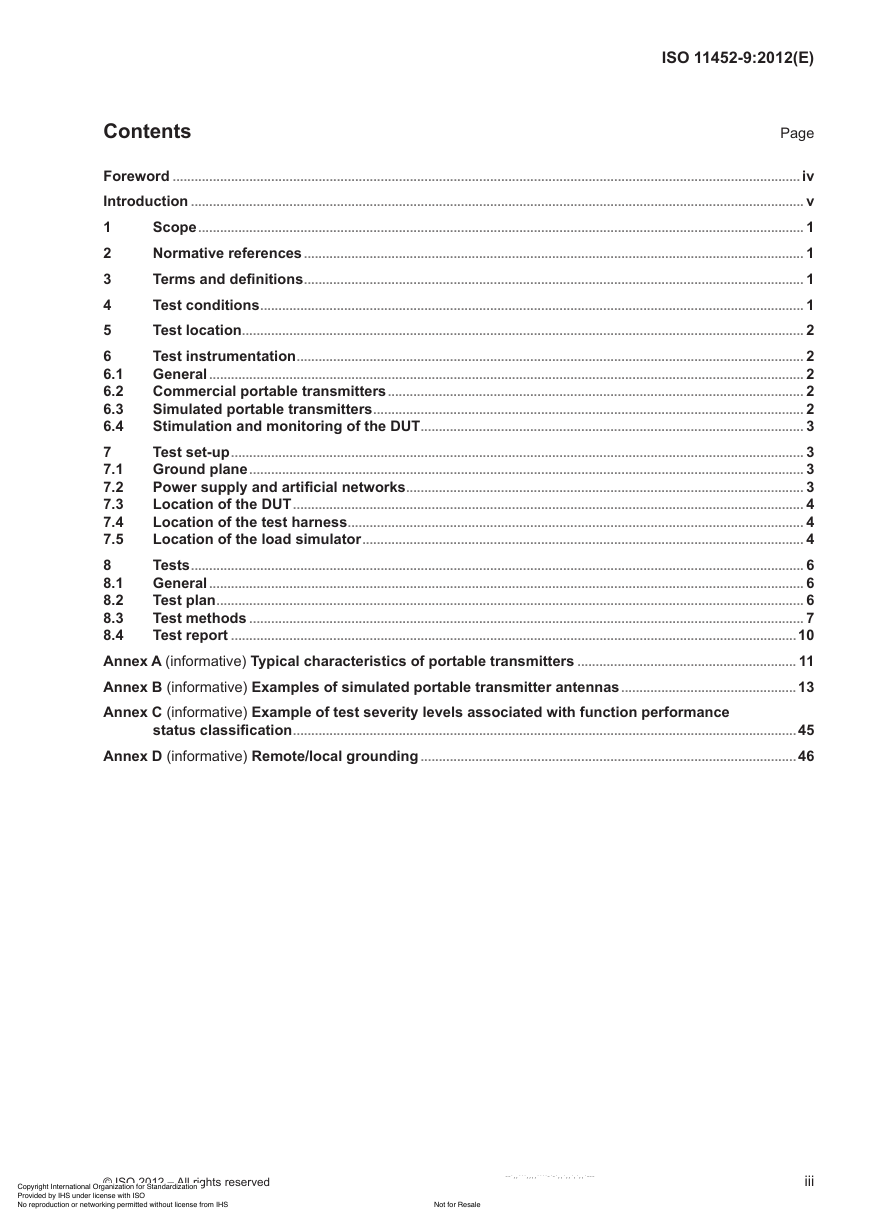
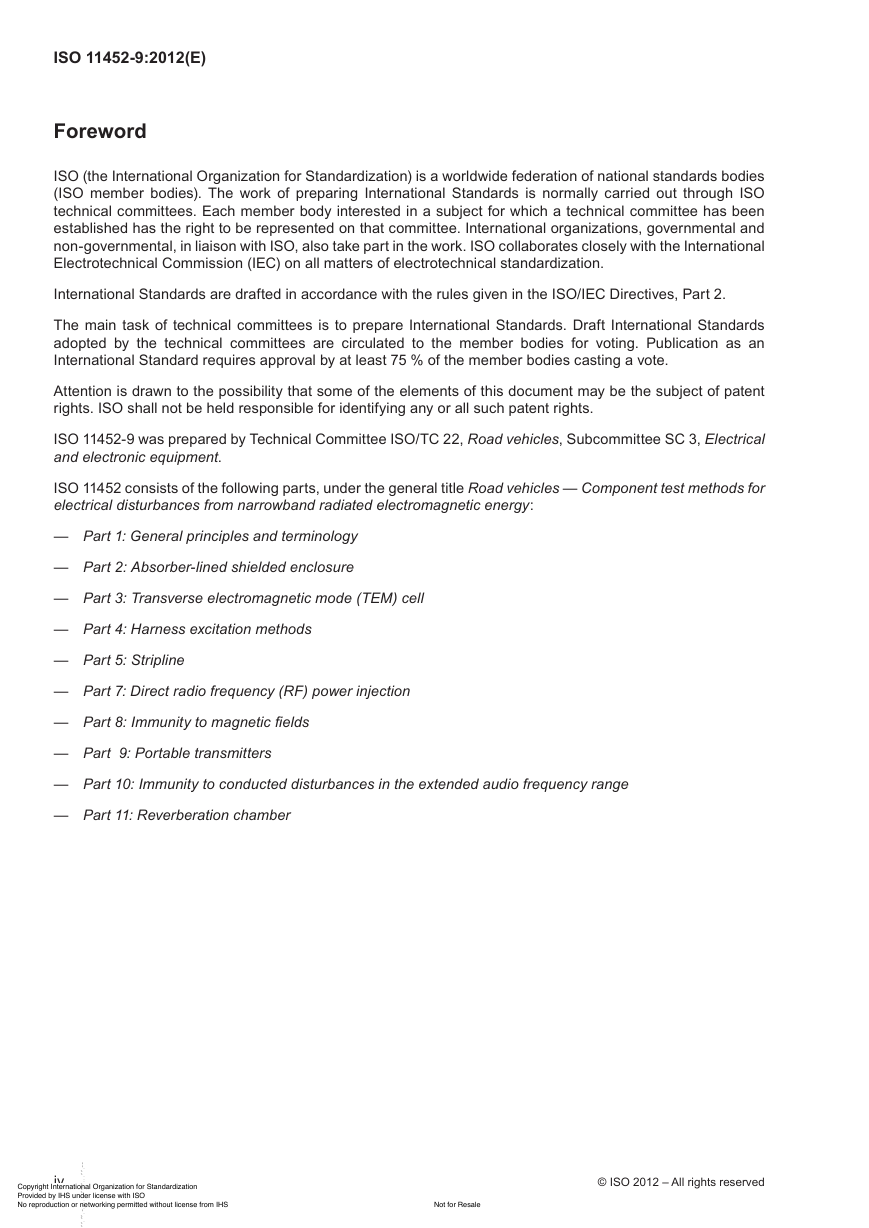
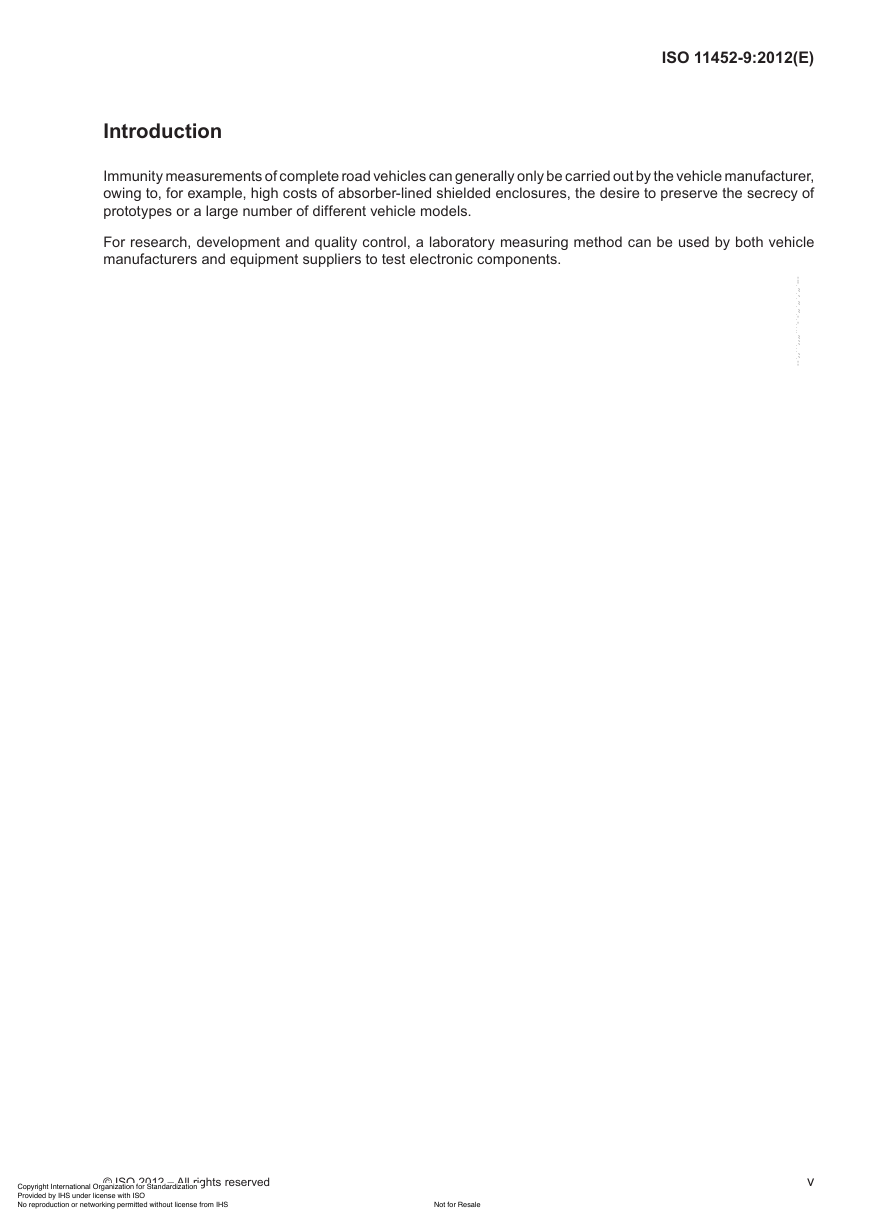

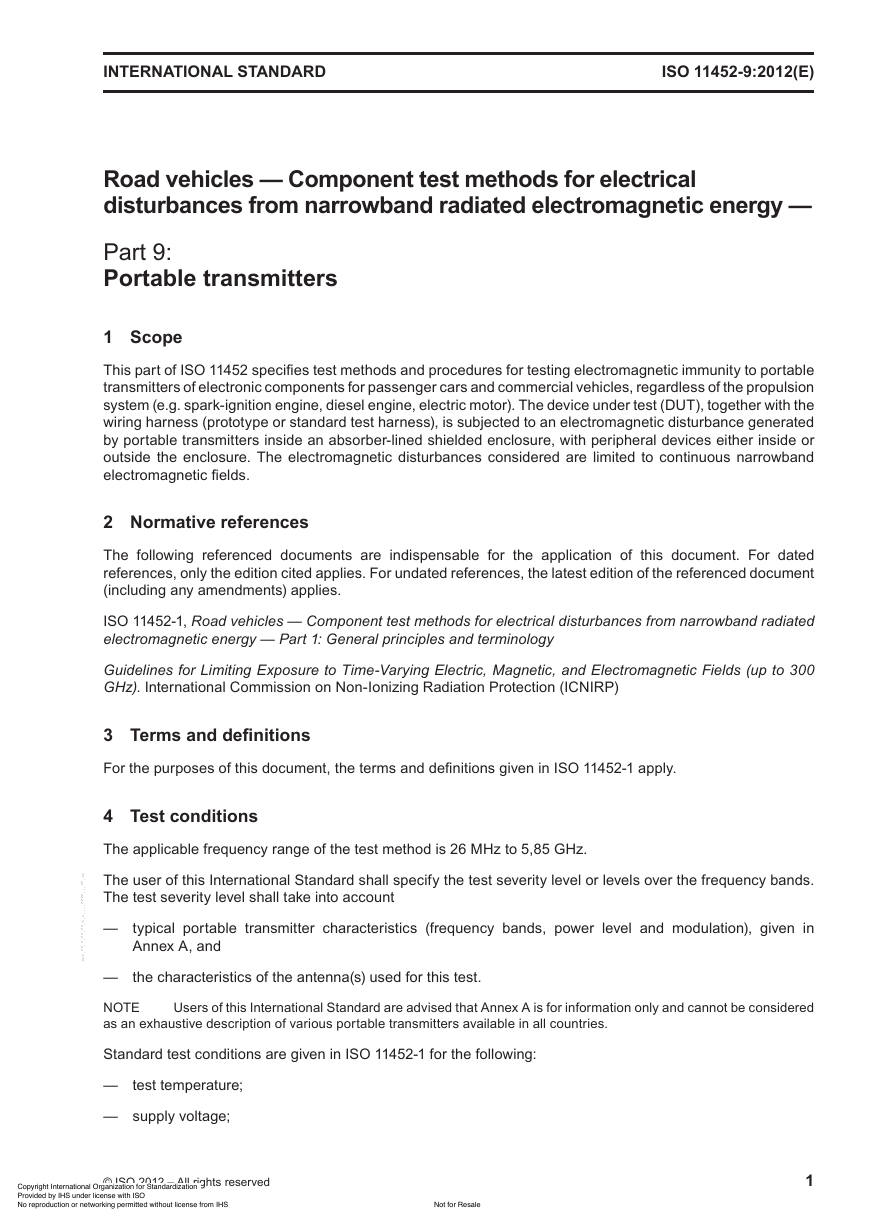
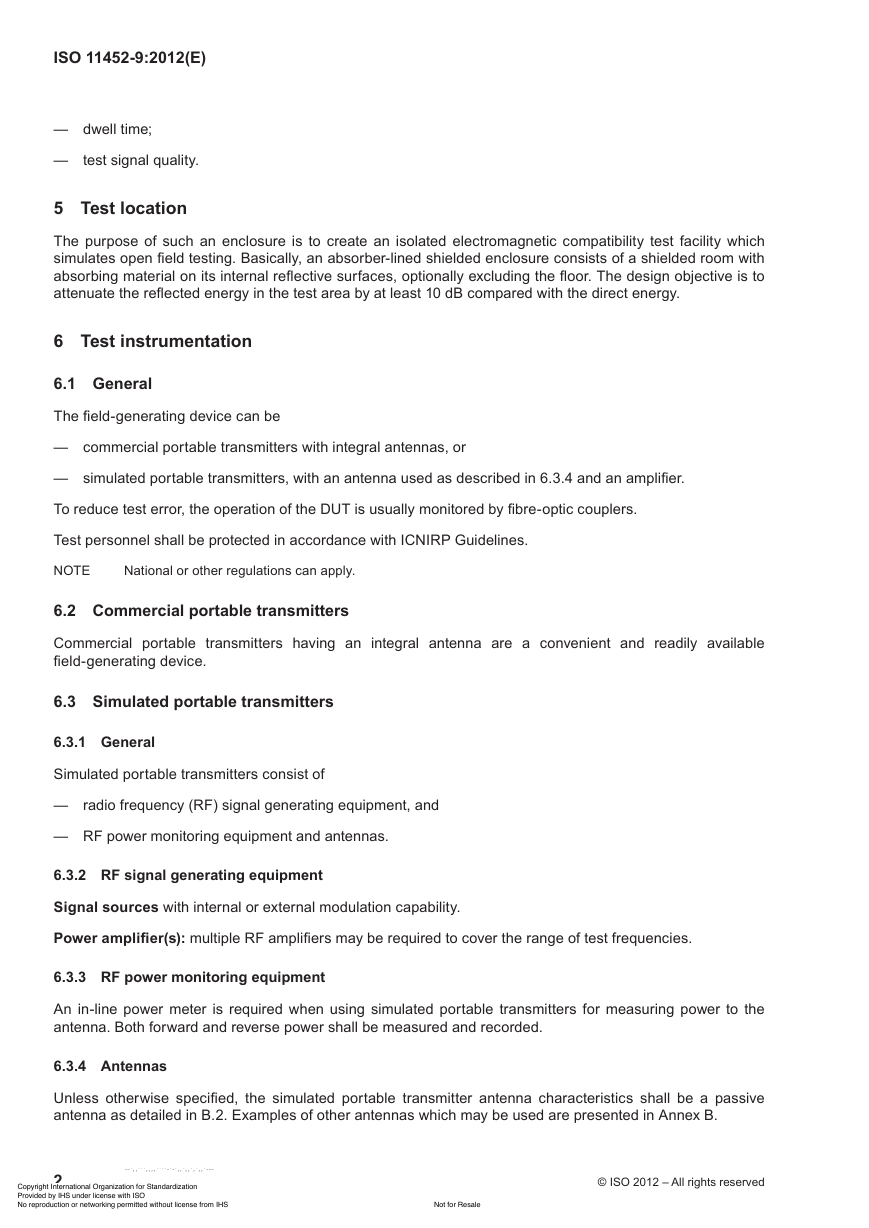








 2023年江西萍乡中考道德与法治真题及答案.doc
2023年江西萍乡中考道德与法治真题及答案.doc 2012年重庆南川中考生物真题及答案.doc
2012年重庆南川中考生物真题及答案.doc 2013年江西师范大学地理学综合及文艺理论基础考研真题.doc
2013年江西师范大学地理学综合及文艺理论基础考研真题.doc 2020年四川甘孜小升初语文真题及答案I卷.doc
2020年四川甘孜小升初语文真题及答案I卷.doc 2020年注册岩土工程师专业基础考试真题及答案.doc
2020年注册岩土工程师专业基础考试真题及答案.doc 2023-2024学年福建省厦门市九年级上学期数学月考试题及答案.doc
2023-2024学年福建省厦门市九年级上学期数学月考试题及答案.doc 2021-2022学年辽宁省沈阳市大东区九年级上学期语文期末试题及答案.doc
2021-2022学年辽宁省沈阳市大东区九年级上学期语文期末试题及答案.doc 2022-2023学年北京东城区初三第一学期物理期末试卷及答案.doc
2022-2023学年北京东城区初三第一学期物理期末试卷及答案.doc 2018上半年江西教师资格初中地理学科知识与教学能力真题及答案.doc
2018上半年江西教师资格初中地理学科知识与教学能力真题及答案.doc 2012年河北国家公务员申论考试真题及答案-省级.doc
2012年河北国家公务员申论考试真题及答案-省级.doc 2020-2021学年江苏省扬州市江都区邵樊片九年级上学期数学第一次质量检测试题及答案.doc
2020-2021学年江苏省扬州市江都区邵樊片九年级上学期数学第一次质量检测试题及答案.doc 2022下半年黑龙江教师资格证中学综合素质真题及答案.doc
2022下半年黑龙江教师资格证中学综合素质真题及答案.doc